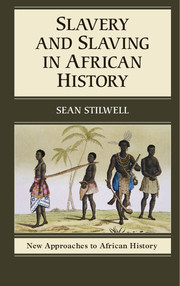6 - The End of Slavery in Africa
Published online by Cambridge University Press: 05 June 2014
Summary
Introduction
During 1903 and 1904, Salemi fled from the interior to the coast of Italian Somalia after a number of laws were passed by the colonial government that – at least in theory – abolished the institution of slavery. Salemi had, twenty years previously, been captured as a slave on the Mrima coast. He was then taken by traders to Merka, where he was sold to Sherif Omar, who kept him until 1896, when he was sent to Abiker bin Mire to pay off a debt. His new master worked him very hard in the fields, and even put him in leg irons. Salemi eventually escaped and fled to the coast. Many other slaves also fled the plantation. Of Abiker bin Mire’s original twenty working slaves, only eight remained by 1904.
We never paid a zakat, partly because there were no cereals, but primarily because we did not own anything, we could not give anything because we had no ownership over anything at all. We could not even marry. After the arrival of the French, if we wanted to become independent we could try to pay a sum [fansa] to the master, and the master would have to free us. Money was rare, back then, so one would give animals. But before the French, ransom was not possible because we had nothing, we could not earn anything either.... Life was different, and a slave had no independence. A slave was like one of the animals of his master. He could not move without his master’s agreement.... Now many old masters are not powerful anymore. The sources of their wealth were animals and milk, which allowed them to support their dependents. But now it’s the time of money and tuwo. Now, the old masters are our younger brothers. We may even send each other reciprocal gifts to commemorate our past relation. Our old masters can remember about us and send us clothes or sugar. There is no more slavery. Thanks to the [whites], we have entered the market.... I have two arms. Give me one job, any job that I can do, and I will not look for the former masters again. And even if an old woman cannot work, she can still go to her relatives, rather than her masters, if they have a job and can support her.
- Type
- Chapter
- Information
- Slavery and Slaving in African History , pp. 176 - 214Publisher: Cambridge University PressPrint publication year: 2014

